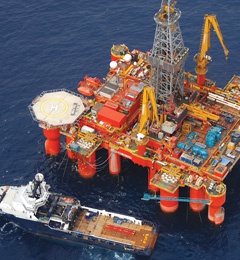The World Bank Board of Executive Directors has approved additional financing of $19.80 million to support the development of Ghana's oil and gas reserves. This brings the total support to $ 57.80 million. The objectives of the project are, first, to help improve public management and regulatory capacity and enhance sector transparency by strengthening the institutions managing and monitoring the sector; and second, support the development of indigenous technical and professional skills needed by the petroleum sector through support to selected educational institutions.
The petroleum sector in Ghana is undergoing a major transformation following the discovery of a large oil and gas field in deep waters about 60 kilometres offshore. The Ghana Oil and Gas Capacity Building Project, approved by the Board of Executive Directors in 2010, supports the establishment of a new regulatory and oversight institutions to ensure the smooth and transparent functioning of the burgeoning oil and gas sectors.
“The discovery of deep oil and gas reserves has resulted in a rapid expansion of the oil and gas industry in Ghana, which has the potential to bring significant economic development opportunities to the country,” says Yusupha Crookes, World Bank Country Director for Ghana. "The strong and transparent regulatory system and technical training of the local workforce supported by the project should help ensure that Ghana derives the maximum possible social and economic benefits from this important endowment.”
The approved additional financing will ensure the completion of key project activities whilst extending the projects closing date by 24 months to June 30, 2017 to allow for completion of activities. The funds will help to establish a national data centre within the Petroleum Commission of Ghana, an independent regulator for the oil and gas sector and also help procure laboratory equipment for Ghana's Environmental Protection Agency (EPA) to strengthen them to monitor and analyse the impacts of oil and gas operations on marine and shoreline ecosystems.
Furthermore, the Oil and Gas Capacity Building Project targets human capital development by providing support to selected tertiary institutions, including the Kwame Nkrumah University of Science and Technology (KNUST) to improve teaching and research in the field of petroleum engineering and petrochemical engineering. Overall, the additional financing will help train more than 800 students at the tertiary level to enhance the human resource needs of the oil and gas industry.
The project, consequently, will contribute largely to the country's effort to effectively manage the oil and gas resource, and thereby generate growth which will serve as a propellant for the non-oil sectors of the economy. “This project's focus on building strong regulatory institutions will indirectly benefit all Ghanaians by increasing the Governments capacity to manage the resources effectively and transparently,” says David John Santley, World Bank Task Team Leader for this Project. “The project will help the people of Ghana to ensure that the country's rich natural resources are a blessing that will expand the economy, create jobs, and improve the quality of life for Ghanaians in general.”
Business News of Saturday, 5 July 2014
Source: Public Agenda
WB builds strong public oversight of Ghana's oil fields













